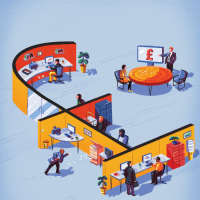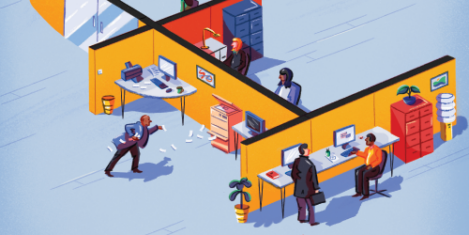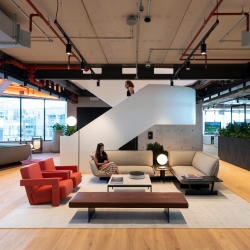May 20, 2021
Is the time right for office furniture as a service?
 The focus on creating a more sustainable workplace is increasing. Many designers, specifiers, manufacturers, suppliers and, of course, users are pledging their allegiance to the cause. Some are driven by a genuine recognition of the climate crisis whilst others are appreciating that commercially, it’s an essential direction. ‘Zero to landfill’ has been given ‘green bragging rights’ for some time. In reality, due to the significantly lower cost of incineration versus recycling, most material isn’t reclaimed, it is burnt. Whilst ‘energy from waste’ might alleviate some guilt, it is still contributing to pollution. (more…)
The focus on creating a more sustainable workplace is increasing. Many designers, specifiers, manufacturers, suppliers and, of course, users are pledging their allegiance to the cause. Some are driven by a genuine recognition of the climate crisis whilst others are appreciating that commercially, it’s an essential direction. ‘Zero to landfill’ has been given ‘green bragging rights’ for some time. In reality, due to the significantly lower cost of incineration versus recycling, most material isn’t reclaimed, it is burnt. Whilst ‘energy from waste’ might alleviate some guilt, it is still contributing to pollution. (more…)







 The European Commission recently announced its proposal for the regulation of artificial intelligence, looking to
The European Commission recently announced its proposal for the regulation of artificial intelligence, looking to 
 We’re all biased. We all recognise the sharp bump of our critical thinking skills kicking into life when confronted with ideas and information that go against our beliefs. We know how they doze in the comforting embrace of affirming data. So, it’s been entertaining this week to observe the reaction to
We’re all biased. We all recognise the sharp bump of our critical thinking skills kicking into life when confronted with ideas and information that go against our beliefs. We know how they doze in the comforting embrace of affirming data. So, it’s been entertaining this week to observe the reaction to 
 At 6.31 a.m. on Tuesday, December 8, 2020, the UK became the first country in the world to administer the COVID-19 vaccine. Just over five months earlier, I had been deployed to the NHS England and NHS Improvement COVID-19 vaccination programme to help drive the highly complex design and planning needed to bring the nation to this point. My role involved leading the set up and embedding of the Estates, Equipment, Consumables and Logistics workstream. The purpose of this was to establish and combine the new and existing infrastructure required in England to manage the distribution, regulation and administration of multiple vaccines so that all systems would be ready to vaccinate on the ‘go-live’ date.
At 6.31 a.m. on Tuesday, December 8, 2020, the UK became the first country in the world to administer the COVID-19 vaccine. Just over five months earlier, I had been deployed to the NHS England and NHS Improvement COVID-19 vaccination programme to help drive the highly complex design and planning needed to bring the nation to this point. My role involved leading the set up and embedding of the Estates, Equipment, Consumables and Logistics workstream. The purpose of this was to establish and combine the new and existing infrastructure required in England to manage the distribution, regulation and administration of multiple vaccines so that all systems would be ready to vaccinate on the ‘go-live’ date. 
 As 2020 came to a close, there was a palpable sense of hope that 2021 would bring with it a fresh slate with the horrors of COVID behind us. Alas, that has not happened and it seems we have more of the same, certainly for the next few months and with that the speculation about the ‘future of the office’ will no doubt continue.
As 2020 came to a close, there was a palpable sense of hope that 2021 would bring with it a fresh slate with the horrors of COVID behind us. Alas, that has not happened and it seems we have more of the same, certainly for the next few months and with that the speculation about the ‘future of the office’ will no doubt continue. 
 Is the workplace industry stuck in the past, in a 20th century model of how and where work is done? The separation of work and the rest of life during the Industrial Age has shaped the structures of modern life: the houses we live in, the offices, factories and shops we work in, and the transport networks that shuffle us from one location to another for different activities. It has also shaped the planning system, the institutional and financial structures of how places are designed and built, and perhaps most of all the mindsets of just about everyone involved in creating places to work and live.
Is the workplace industry stuck in the past, in a 20th century model of how and where work is done? The separation of work and the rest of life during the Industrial Age has shaped the structures of modern life: the houses we live in, the offices, factories and shops we work in, and the transport networks that shuffle us from one location to another for different activities. It has also shaped the planning system, the institutional and financial structures of how places are designed and built, and perhaps most of all the mindsets of just about everyone involved in creating places to work and live. 
 Businesses are managing a new work dynamic that’s made up of three parts, or three ‘types’ of employee. Some are keen to go back to the office, some want to stay working from home, and some want an entirely flexible arrangement so they can fit work around important personal commitments.
Businesses are managing a new work dynamic that’s made up of three parts, or three ‘types’ of employee. Some are keen to go back to the office, some want to stay working from home, and some want an entirely flexible arrangement so they can fit work around important personal commitments. 
 Every week a new survey is published or a statement from a CEO hits the press related to corporate occupier’s desire to adopt a form of hybrid working for the long-term post Covid 19. And as a result, the desire to occupy less space in their central office hub. Landlords are asking- What do we do now to attract and keep great occupiers, and fill our buildings? I have an idea that is of its time. A time when the world has started to cooperate, collaborate, and work towards a common purpose. When work, life, values, and priorities are shifting. Employers are seeking to look after their people in a holistic way in and out of the office.
Every week a new survey is published or a statement from a CEO hits the press related to corporate occupier’s desire to adopt a form of hybrid working for the long-term post Covid 19. And as a result, the desire to occupy less space in their central office hub. Landlords are asking- What do we do now to attract and keep great occupiers, and fill our buildings? I have an idea that is of its time. A time when the world has started to cooperate, collaborate, and work towards a common purpose. When work, life, values, and priorities are shifting. Employers are seeking to look after their people in a holistic way in and out of the office. 


 “Hi Dougie – how’s the new hybrid workplace going?”
“Hi Dougie – how’s the new hybrid workplace going?”
 Earlier this month the
Earlier this month the 








May 20, 2021
The pandemic will transform the way we commute
by Tim Burgess • Comment, Flexible working, Wellbeing